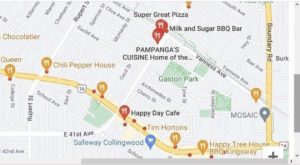 When you think of branding or brand, often you think of a rancher who takes a hot iron in the shape of a logo or a name representing his ranch and stamps it on the side of his livestock so everyone will associate that cattle with this rancher. The same is valid with branding yourself or your business venture. If you are thinking of starting a small business and you’ve identified the market, and you’ve found a niche – or a position that you feel comfortable with, now you need to consider how you will brand yourself. Even without a business and you have something to stand for or something to promote, whether an idea or a cause, you can still brand yourself. What will others see as your brand?
When you think of branding or brand, often you think of a rancher who takes a hot iron in the shape of a logo or a name representing his ranch and stamps it on the side of his livestock so everyone will associate that cattle with this rancher. The same is valid with branding yourself or your business venture. If you are thinking of starting a small business and you’ve identified the market, and you’ve found a niche – or a position that you feel comfortable with, now you need to consider how you will brand yourself. Even without a business and you have something to stand for or something to promote, whether an idea or a cause, you can still brand yourself. What will others see as your brand?
What Is A Branding?
Branding is creating a distinct identity for your business or yourself in the mind of your target audience or people in general. The practice of branding – in the original literal sense of marking by burning – is thought to have begun with the ancient Egyptians, known to have engaged in livestock branding in ancient times. Branding was used to differentiate one person’s cattle from another’s using a distinctive symbol burned into the animal’s skin with a hot branding iron.
In the modern era, the concept of branding has expanded to include deployment by a manager of the marketing and communication techniques and tools that help to distinguish a company or products from competitors, aiming to create a lasting impression in the minds of customers. The key components that form a brand include a brand’s identity, personality, product, and design.
Misconceptions About Branding
Marty Neumeier, author of “The Brand Gap,”- defines a brand this way: “A brand is not a product. It is not a promise. It is not the sum of all the impressions it makes on an audience. A brand is a result. It’s a person’s gut feeling about you or a product, service, or company. A brand is a reputation, your business reputation.” In other words, what reputation will your brand create?
There are two types of brands, but they both accomplish the same thing: a personal and a business brand. Let us examine the difference between the two.
Personal Brand
In a personal brand, you are simply branding yourself. For example: If you are an expert at something or want to sell yourself as such, then you might want to think of going with a personal brand. In other words, you are selling yourself. You can set up a blog, website, or a column of some sort and build a following of “you” and promote your expertise from there.
Business Brand
Business Dictionary.com in regard to the word brand states: “The entire process involved in creating a unique name for a product, good, or service in the consumers’ mind.” In another word with a business brand, you are promoting the business itself, whatever that business may be. If you are selling a product or service or if you are building a “brick and mortar store,” on or offline, then you might want to think of a good business brand that will identify something unique about your business.
What Branding Accomplishes
Shayna Waltower a guest writer for “Business News Daily” or BND wrote the benefits this way:
1. It establishes your credibility. They see you as a trusted authority within your niche.
2. You are seen as an expert. A strong brand reflects your expertise in your field.
3. It sets you apart from the competition. Remember your brand is what makes you unique. It can show people how you stand out on a cause or how your business differs from other companies.
4. It demonstrates your value to others. Your brand highlights your personality, passions, and motivation so potential customers can see and relate to it. It gives them an experience instead of merely a product or completed service.
Branding is the process of creating a distinct identity for yourself or your business in the mind of your target audience or others in general. What will your brand accomplish for you? Your brand may seem like it consists only of elements such as logos and colors, but your brand is actually the entire identity of your business. According to Forbes: “Your brand gives you personality.” Branding can help build trust.
One advantage of a personal brand is if you feel that in time you might want to promote something else or branch off from your original niche in some way, then you can do so without having to re-brand so-to-speak because it can be accomplished with the same brand or reputation.
But if you are building a business and just want to stick with a certain name or brand, then you may want to go with a business brand. One advantage of this is in time the brand itself will take on value if you decide to sell down the road.
How Will You Brand Yourself With Social Media?
 Using social media platforms and tools is relatively easy to get your brand “out there!” Just use your accounts with Facebook, Twitter, LinkedIn, and others to promote your brand online. And it’s free! Digitalmarketinginstitute.com states: “regularly share content to different platforms and keep them positive & engaging. Also, identify your area of expertise. Everyone is an expert at something – whether it’s how to create and distribute great content or having a comprehensive knowledge of your favorite TV show.”
Using social media platforms and tools is relatively easy to get your brand “out there!” Just use your accounts with Facebook, Twitter, LinkedIn, and others to promote your brand online. And it’s free! Digitalmarketinginstitute.com states: “regularly share content to different platforms and keep them positive & engaging. Also, identify your area of expertise. Everyone is an expert at something – whether it’s how to create and distribute great content or having a comprehensive knowledge of your favorite TV show.”
With Facebook, you can create a Business page and invite your followers to view it. Use Twitter to “tweet” your brand or message several times a week. You can use social media tools such as Sprout, Buffer, or Hootsuite to schedule your tweets and blog posts. Or plan it on the platform itself. If you have a business, use Pinterest to create a “Board” as your primary category and then “Pin” photos or information pertinent to your business. Linkedin is a popular site to promote your business and build a following to engage with and share content with others to promote your brand. Foursquare is another social media platform to target local customers by building up local followers and engaging with them as well.
Do Your Homework:
There is plenty of information out there that will provide you with tips and ideas as to how to brand yourself. There are several blogs on branding, what taglines you can use, and websites that will help you to create your logo. Just do a simple search. Give it a lot of thought. Because when it comes to starting a business, there is nothing more important than how you brand yourself.
Conclusion
If you decide to use a logo, an image, a tagline, or a catchy phrase to represent your brand and to promote it on social media then that’s good. No problem. But how you brand yourself will determine how you or your business is well perceived in the eyes of others, as an individual or an established entrepreneur.
 The internet is the most powerful tool in the world. It’s changed our lives and made connecting with people from all over the planet more accessible. But what about when you want to talk to people who live right in your backyard? Suppose you’re running a local business or trying to reach out to your local community. In that case, local SEO is an essential part of how your business can stand out from the crowd—and get discovered by potential customers.
The internet is the most powerful tool in the world. It’s changed our lives and made connecting with people from all over the planet more accessible. But what about when you want to talk to people who live right in your backyard? Suppose you’re running a local business or trying to reach out to your local community. In that case, local SEO is an essential part of how your business can stand out from the crowd—and get discovered by potential customers. Once your business listing is there on Foursquare, claim it. When you claim your location, you are telling Foursquare you are the manager of that venue. You can claim multiple locations of Foursquare; all you need to do is to provide verifiable contact information. Once you have listed and claimed your site on Foursquare, you can begin adding specials, checking your analytics, and much more. But the most important way to use Foursquare is to take the time to build a network of just local followers and interact with them.
Once your business listing is there on Foursquare, claim it. When you claim your location, you are telling Foursquare you are the manager of that venue. You can claim multiple locations of Foursquare; all you need to do is to provide verifiable contact information. Once you have listed and claimed your site on Foursquare, you can begin adding specials, checking your analytics, and much more. But the most important way to use Foursquare is to take the time to build a network of just local followers and interact with them.